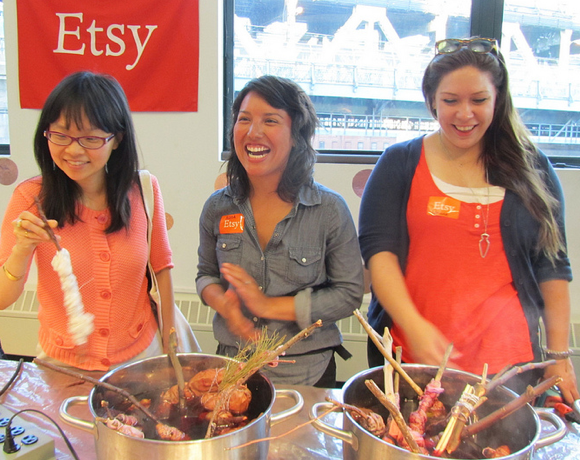Etsy Goes Beyond Online Sales to Support Local Economies
by Krislyn Placide | October 24, 2012

Last year, Americans spent an estimated $194 billion on online purchases, according to the U.S. Commerce Department. That’s a lot of buying! But just because we’re capable of consuming so much stuff via the Internet, that doesn’t mean we have to forget about our local economies and small businesses.
That’s where Etsy comes in.
Many of us know Etsy.com as a crafting and vintage sale website. Through the company’s global Internet marketplace, launched in 2005, shoppers can search for funky, handmade goods ranging from vintage jewelry to block-printed pillows. By requiring goods sold on the site to be either handmade or “vintage” (items should be at least 20 years old), Etsy strives to minimize consumption of mass-produced, cookie-cutter products.
But the Brooklyn, New York-based company also aims to support local entrepreneurs and communities more directly. If you want to buy something local, you can type in your zip code to connect with a person in your area who is selling something via the site. Etsy also offers educational and community resources to help small-scale producers improve their businesses and surround themselves with like-minded individuals.
“We believe that commerce can be a way to address social problems of the day—not necessarily through shopping itself, but through entrepreneurship,” says Matt Stinchcomb, the company’s Vice President of Community. “We started Etsy not as a business as much as it was a need we were trying to fill. We were makers trying to sell our stuff, and we didn't have a place to sell it.”
Now the Etsy marketplace is booming. In September alone, the web-based community gained 866,750 new members, and $76.8 million of goods were sold. And, seven years after its inception, Etsy now has two major programs to support producers and entrepreneurs on a local level.
Building community via team effort
As one of its initiatives, Etsy offers a plethora of “teams” that members can join (or create their own) as a way to develop affinity groups and find community. Teams can be organized not just by locale, but also by interest, by cause, or by a specific item that someone may make (one team, Recycled Artists, comprises members who create "green goods" from junk, vintage, and other items saved from landfills). But members who live in the same area have a big advantage: they can hold meetings and workshops in-person, and organize local craft fairs and other events.
“When you work alone in your house, making stuff all day, it gets a little bit lonely,” Stinchcomb says. “As we move toward less-traditional forms of work—no longer going to an office every day, or having multiple part-time self-entrepreneurial pursuits—this is the community that forms around this kind of work.”
Etsy supports the teams by subsidizing the cost of booths at craft fairs for sellers. The company also works with third parties to offer practical services to sellers, including accounting and shipping help. The goal of the program is to try to remove some of red tape that would bar small producers from making money off of their goods.
Etsy Labs
Etsy’s other major initiative, the “Labs” program, is not yet available in most cities, but it is expected to grow as the company expands. Currently, there are two main community centers, one at Etsy’s home base in Brooklyn, and another in Berlin, Germany. At these locations, Etsy administrators host classes to help people in the community learn how to make things and run small businesses.
The Brooklyn location, for example, hosts craft nights where both the meeting space and the equipment are open to the public (see video below). Through a monthly Hands-On series, community members can engage with and learn from creative professionals using the company’s Vandercook letterpress machine, Bernina sewing machines, Simplicity felting machines, screen printing facilities, and more. Already, the Etsy Labs MeetUp group has some 4,900 members.
“Etsy has community at its roots,” Stinchcomb says. “We realized that what’s really special about it is that there’s a person behind every product. We’re always looking to maximize the human experience in everything that we do."
As the community of makers and crafters continues to grow, online entities like Etsy can enable entrepreneurship while strengthening local economies
Krislyn Placide is an intern at New Dream.

